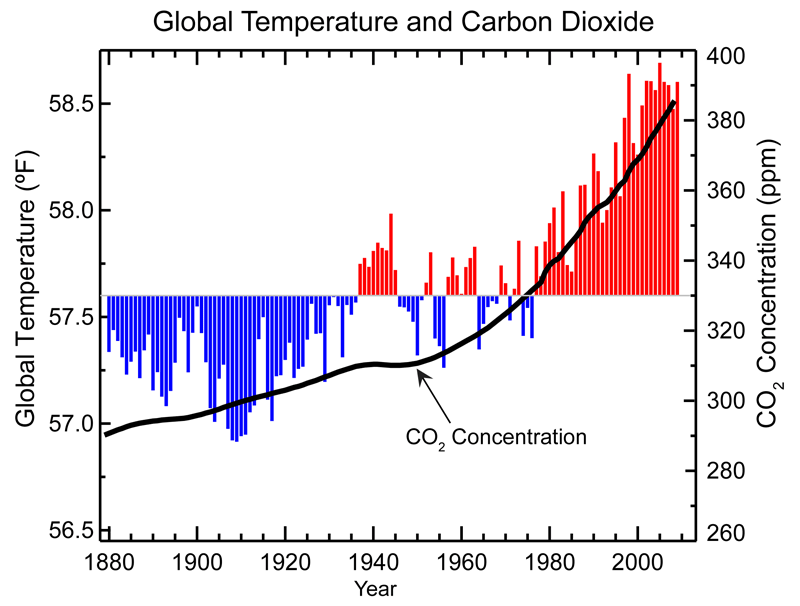
Climate Change IS Real
Many people support the idea that climate change is happening, both scientists and non-scientists. What evidence do they have for their side of the argument? Let's take a look:
Due to the abundance of indicators toward climate change, it is undeniable that it is real. Climate change is a threat that we need to do
something about.
Non-scientific evidence:
Even without the rigorous analyses of science, a non-scientist can tell climate change is a real thing.
The first that comes to mind when you think of climate change is rising temperatures. While it may not be true that temperatures are rising everywhere, that's not what climate change is about. Climate is the description of long-term weather patterns in a particular area, and it's clear that the climate has been changing. Over the years, seasons and temperatures have been thrown out of whack (with different times for the first snow and changing seasonal temperatures). Many migratory animals, such as Canada geese and monarch butterflies seem to have their timings altering by the changing climate.
Greenhouse gases are another big thing for climate change. Greenhouse gases such as carbon dioxide trap heat in the Earth in what is called the greenhouse effect. Now, the greenhouse effect is entirely natural and is what keeps the Earth a livable planet, but as many people learned when they were very young, "too much of a good thing is a bad thing." The surplus of greenhouse gases we are producing with our technology is overheating the Earth.
Finally, you have to consider all the prediction models climate scientists have been putting forth. These scientists have a great understanding of what factors influence the Earth's climate, and use the latest technology, powerful computers, and standardized methods to find the trends in current data and create projections for the future. Putting trust in these models, it seem that climate change is undeniably real.
Scientific evidence:
Climate scientists have been conducting research and analyzing lots of data to search for evidence of climate change occurring, and indeed it is!
First and foremost, let's observe the relationship between CO2 levels and global temperatures. Since 1880, the global CO2 level has risen by about 100 parts-per-million, corresponding with a rise in temperature of over 1.5 degrees Fahrenheit or about 0.8 degrees Celsius. It is quite easy to link there factors together and conclude that rising levels of anthropogenic greenhouse gas emissions since the pre-industrial era (driven largely by economic and population growth) are extremely likely to have been the dominant cause of the observed warming since the mid-20th century (IPCC, 2015).
Over the past century, the global mean sea level (GMSL) has risen by 10 to 20 centimeters. However, it is important to note that in the last 20 years, the sea level has been rising at a rate of 3.2 millimeters a year... roughly twice as fast as the preceding 80 years. The rising sea level can be connected to the rising temperatures. When heated up, water will expand to take up more space, and the increasing temperatures are melting glaciers, ice at the poles, and the massive ice sheets of Antarctica. At the current rate, it is projected that sea levels could rise by 0.8 to 2 meters by 2100, enough to swamp out many coastal cities.
Finally, changes in many extreme weather and climate events have been observed since about 1950. Some changes have been linked to human influences, including fewer cold temperature extremes, more warm temperature extremes, and an increase in heavy precipitation events.
Human influence has contributed to global changes in the frequency and intensity of daily temperature extremes since the mid-20th century. It is also likely that human activities have doubled the frequency of heat waves in some locations. There is medium confidence that the observed warming has increased heat-related human mortality and decreased cold-related human mortality in some regions.
Impacts from the more frequent and recent climate-related extremes, such as droughts, floods, cyclones and wildfires, reveal significant vulnerability and exposure of some ecosystems and many human systems to current climate variability (IPCC, 2015).
Scientific evidence for warming of the climate system is unequivocal (IPCC).
References:
Intergovernmental Panel on Climate Change. (2015). Climate Change 2014: Synthesis Report. Retrieved from
https://www.ipcc.ch/pdf/assessment-report/ar5/syr/SYR_AR5_FINAL_full_wcover.pdf
Madaan, S. (n.d.). Is Climate Change Real? Earth Eclipse. Retrieved from
http://www.eartheclipse.com/climate-change/is-climate-change-real.html
Sea Level Rise. (n.d.). National Geographic. Retrieved from
http://ocean.nationalgeographic.com/ocean/critical-issues-sea-level-rise/



A graph of rising temperatures along side rising CO2 levels
A graph of historic sea levels - see the rise?
A graph of the number extreme weather events in the world. Doesn't the rapid climb in recent years concern you?


Making proper predictions is a complicated and scientific process.
